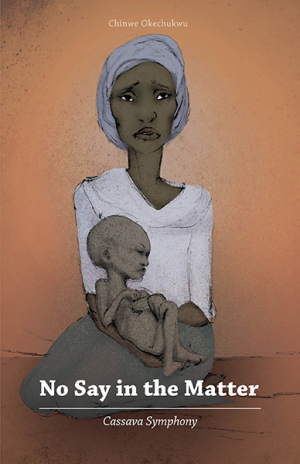No Say in the Matter
Cassava Symphony
A mother fights to keep her family safe in this realistic novel about Nigeria’s Biafran War.
Chinwe Okechukwu’s No Say in the Matter: Cassava Symphony is the first novel in a planned trilogy. The resulting saga will trace the history of one Nigerian family over three generations. This first volume details the matriarch’s harrowing struggle to survive during the country’s civil war in the 1960s, and highlights the region’s language and foods.
Schoolteacher Oyilidiya’s arranged marriage to police officer Ngaodi produces one daughter and three sons. Rumors of ethnic violence come close to fruition in 1967 when soldiers kill Oyilidiya’s youngest son right outside her house. As random atrocities build into full-scale war, Ngaodi joins the fighting and Oyilidiya moves between refugee camps with her daughter, preserving normal life as much as possible by continuing to cook and shop.
Oyilidiya is a plucky protagonist, giving birth alone and instigating construction of a new latrine at the refugee camp. She has the courage of her convictions and expresses them forcefully: “Since when has revenge ever cured anything? A bloodied hand is a bloodied hand. It does not matter whose blood.” The novel reveals the reality of war and life as a refugee in sometimes graphic detail. For Oyilidiya and family, finding fresh water and nourishing food and maintaining health despite the threat of malaria are constant efforts.
Okechukwu weaves in local customs and languages to lend authenticity. Everyday life in wartime is difficult, but there are joyful interludes, such as haggling in the market and attending the Nwafor Festival masquerade. Passages in pidgin English, Awusa, and Obigbo give local flavor, but are sometimes overlong. Propaganda speeches and soldiers’ chants are especially successful at evoking the setting. However, the African English does not fully account for inconsistencies in spelling and grammar.
The motif of cassava is a linking metaphor throughout the book, a symbol of everything Oyilidiya resists but eventually accepts. She initially dismisses the plant as food for poor people, inferior to the yams she uses. Information on the sociological history of cassava could be introduced more naturally, but the author uses this simple detail to contrast pretensions and reality. “Cassava and I, we have come a long way,” Oyilidiya finally concedes.
When the war ends, Ngaodi returns changed and Oyilidiya goes to live with her in-laws. At the novel’s close, she is worried that Ngaodi wants to take another wife, and that the violence may not be over for good. The last lines are sobering: “‘The war has finally ended,’ she said. ‘Has it?’ A voice in her mind retorted.” No Say in the Matter: Cassava Symphony and its sequels should appeal to fans of Chimamanda Ngozi Adichie’s Half of a Yellow Sun.
Reviewed by
Rebecca Foster
Disclosure: This article is not an endorsement, but a review. The publisher of this book provided free copies of the book and paid a small fee to have their book reviewed by a professional reviewer. Foreword Reviews and Clarion Reviews make no guarantee that the publisher will receive a positive review. Foreword Magazine, Inc. is disclosing this in accordance with the Federal Trade Commission’s 16 CFR, Part 255.

